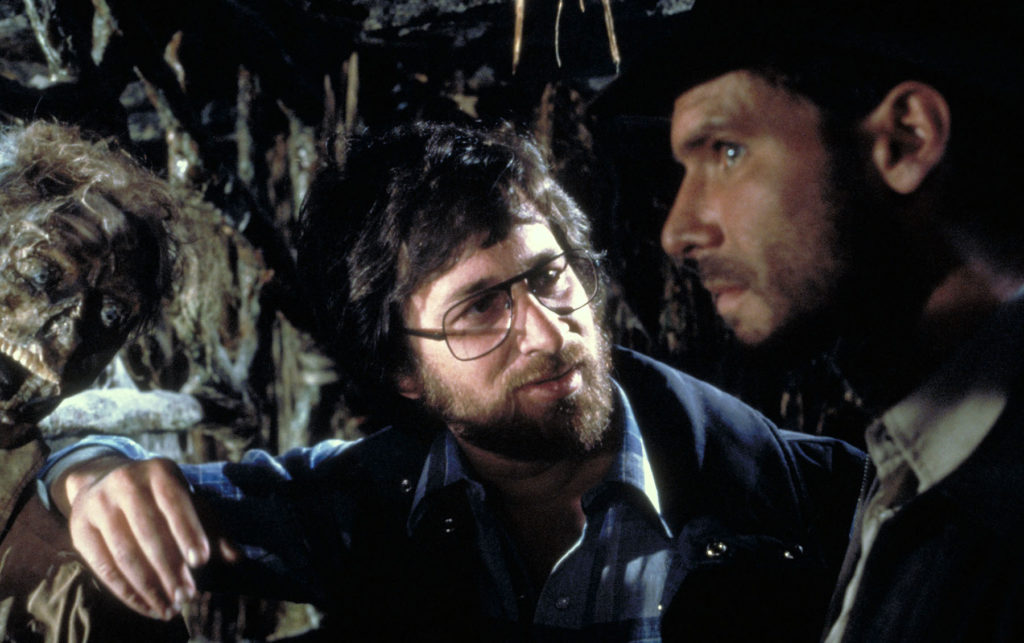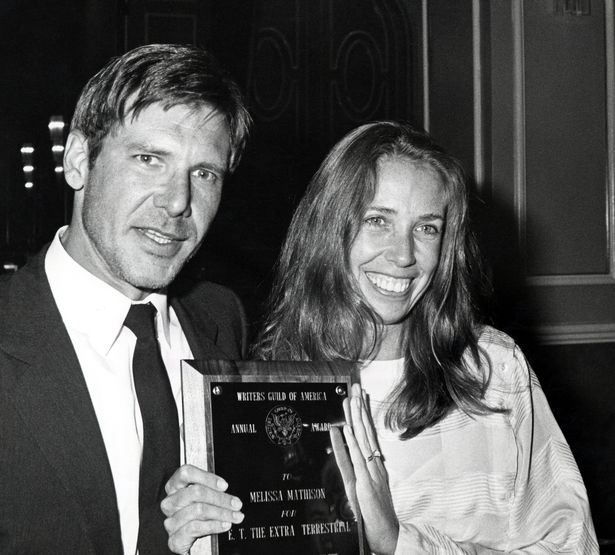
So late last month, a little known E.T. story started making the rounds. Steven Spielberg had finished 1941 and was currently on production of Raiders of the Lost Ark. Like any smart director, he was lining up his next film, E.T., and needed a writer. As luck would have it, he wanted a young writer named Melissa Mathison, who was his star’s (Harrison Ford) girlfriend at the time.
This is where the story gets interesting. Spielberg pitched Mathison the idea for E.T. and Mathison said no, she didn’t get it. I just want to pause here so we can all hear the galactic level record scratch of a writer SAYING NO TO STEVEN SPIELBERG! In Mathison’s defense, she had a good reason for the rejection. She’d just quit screenwriting.
Between her two lone credits, The Black Stallion and The Escape Artist, Mathison had decided that screenwriting was “too hard.” In retrospect, Mathison’s early retirement never stood a chance. Spielberg went straight to Ford, asked him to put in a good word for him and E.T., and Mathison eventually came around to write the film. For all involved, it was ‘happily ever after.’

However, Mathison’s reason for the initial rejection stuck with me. She quit screenwriting, at just 31 years old and with two produced credits, because it was “too hard.”
“Too hard.”
Is screenwriting “too hard?”
It sure seems easy when you’re watching a bad movie. “I could write a better movie than that!” somewhere north of 100 million moviegoers have said over the years.
But anyone who’s spent even three years in the game knows how deceptively difficult screenwriting is.
But is it too hard?
Is it not worth the trouble?
A while ago I was developing a sports script with a writer and we’d spent countless hours and many drafts trying to figure out our main character. It seemed like every new draft, we tried a new iteration of the character. After about draft 7, the character finally started to take shape. We finally felt like we understood him, and the rest of the script came together nicely as a result.
Then, around draft 10, as we were writing the big final game, it occurred to us that the ending would be MUCH BETTER if our main character made a major sacrifice at a critical point late in the game. We’re talking, the climax went from being a 6 out of 10 to a 9 out of 10. The change was a no-brainer. We had to do it.
But here was the problem. Our main character was not someone who sacrificed. Nowhere in the script was this built into the character so that when the moment came, it would make sense for him to sacrifice anything.
What we realized was, if we were to write this new direction into the climax, it would mean completely redesigning the character from the ground up. He’d have a totally different personality and demeanor. Which would make all of his actions and dialogue different.
On top of that, we’d designed the love interest to be in stark contrast to our main character. She was his opposite. By changing the main character into this new version, he was no longer the opposite of the love interest. Which meant – as I’m sure you’ve already figured out – we’d have to completely rewrite her as well! Change her from the ground up so that this new version of her was opposite to the new version of him.
So now we had to sit down and make a difficult decision. Do we make all these changes, redesigning our two main characters from the ground up, just to support this awesome ending? Or do we continue to try and find another great ending, despite the fact that we’d spent the previous six months doing just that and failing?
Is screenwriting hard?
If you’re doing it right, you bet your ass it’s hard.
So I get Melissa Mathison. I totally understand where she was coming from. Because a script can feel like a never-ending battle. In a way, you never truly write the script you want. You either run out of steam or, if you’re one of the blessed few who have made it to the professional ranks, they need to start shooting.
With that said, I have found some tips and tricks over the years to make the experience of writing screenplays a little easier. If you incorporate these ten tips, you’re going to keep more hairs on your head, and severely lower your chances of having a heart attack.
Outline – One of the things that causes so much pain in screenwriting is all the drafts. You’re always having to fix some aspect of the script with a rewrite. You can knock about 3-4 drafts off that process if you outline. In particular, outlining helps you figure out your structure ahead of time, which means spending less drafts fixing your broken structure.
Make sure you understand your 2-3 main characters as clearly as possible going into the script – The hardest thing about screenwriting is getting the characters right. That’s because people are complex and creating fictional versions of them that feel authentic takes an incredible amount of skill. Therefore, if you have a great feel for your characters going in, you eliminate a lot of headaches later on. Rocky is an underdog who doesn’t know if he has what it takes. Alan in The Hangover is the most socially unaware overly opinionated man in the universe. Guy (Free Guy) is tired of following the same old routine every day and decides he’s going to commit to doing things outside his comfort zone. Just like these examples, try and distill your character down to a single clear sentence. If you can do that, you should be good.

Keep your story simple – I read a lot of “everything-and-the-kitchen-sink” scripts where the writer is shooting themselves in the foot by giving themselves a massive amount of variables to keep track of. The reality is, most of the best movies have a simple setup and execution. Small character count. Clear goal. Etc. By keeping the variables down, you’ll keep the stress level down.
Be passionate about your concept – As much as I talk about finding the best idea you can come up with and writing it, that’s worthless advice unless you love the idea. As most of us here can attest to, there is nothing worse than writing a script you’re only kinda into. Every draft feels like five drafts. These scripts take way more out of you and will definitely accelerate any doubts you have about whether screenwriting is for you. Love that idea like you love your family.
Write lean – If you tend to write 4-line paragraphs, aim for 3 lines. If you tend to write 3-line paragraphs, aim for 2 lines. Writing lean means there are less words to edit and since we’re all writers and obsessive about making every little sentence perfect, the less words you have to wade through, the less hassle writing is going to be. As a bonus, your script is easier to read through.
Don’t deliberately make the process overwhelming – You’ve got a document detailing all the characters in your script, a document for your potential story ideas to use, you’ve got your outline, an excel spreadsheet tracking when and where every character appears, you’ve got a document for alternate scenes, a document for deleted scenes, a document explaining the alien language spoken in your script… If all these things make you genuinely happy, fine. But, at a certain point, we make the process of writing a script so cumbersome, that we start to hate the idea of working on it. It’s fine to get detailed. But don’t get carried away.
Focus on the things you should do, not the things you shouldn’t – I know reading this site can sometimes feel like a never-ending mine field of screenwriting bombs to avoid. But if all you’re doing is focusing on mistakes to avoid, you can’t write freely and you won’t have fun. You are always going to do things in your script that “shouldn’t be done,” like yesterday’s choice to make the protagonist a kidnapper. But as long as you feel it’s right for your story, embrace it and don’t look back.
Talk it out – Find someone in your life who will listen to you talk out the problems in your screenplay. One of the reasons writing is so hard is that we contain ourselves to just our brain and run the same problems through that calculator over and over and over again with no result. Of course writing starts to feel impossible (and drives you crazy!). Sometimes you need to talk your ideas out with someone, even if they’re not a screenwriter. By forcing yourself to explain the issue to a third party, you see the problem through their eyes, and that alone helps you find a solution.
Focus on the stuff that matters – Stop stressing about that exposition scene on page 70 where you’re trying to make each dialogue line perfect. Instead, focus on the things in your script that have the biggest impact on the read. The first ten pages, the first act turn, the midpoint shift, the story’s big set pieces, the hero’s low point, any major twist scene, the climax. That’s where you should be placing 75% of your focus. You don’t need to drive yourself crazy over those smaller scenes where the characters reveal some mildly significant backstory about themselves. In the grand scheme of a screenplay, those scenes are way down on the priority list.
Be easy on yourself – Screenwriting is hard no matter what you do. It’s baked into the pursuit. However, I think that’s why we do it. We know that in those few moments where we do crack the code and write a good script, we’ve achieved something amazing, something that very few people on the planet can do. Who cares if you achieve something that’s easy, right? You only feel a sense of accomplishment when you’ve achieved something that’s hard. Maybe even too hard. :)
What’s your take on this? Is screenwriting too hard?
Having concerns about your logline or screenplay? Let me help you. Logline consults are just $25 (and if you buy 4, you get a 5th for free). I also provide consultations for each stage of the screenplay journey: outline ($99), first 10 pages ($75), first act ($149), full pilot ($399), full screenplay ($499). I’ve read thousands of screenplays, including all the ones that get produced and all the ones that don’t. There’s no one better equipped to help you improve your script than me. If you’re interested in getting a consultation, e-mail me at carsonreeves1@gmail.com and let’s work together!

